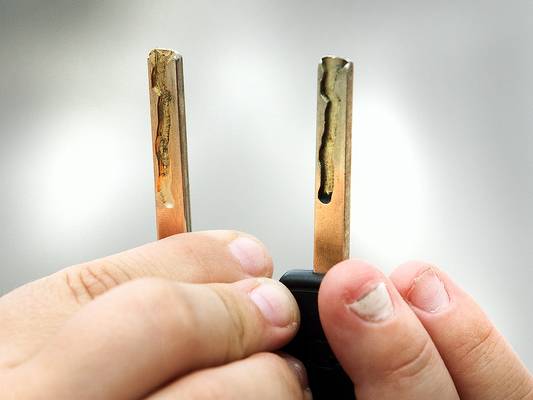By Melissa Crowe
Victoria Advocate, Texas.
Elissa Rabalais isn’t breaking the glass ceiling. She’s unlocking it.
A year into her position as a locksmith with Pop-A-Lock, Rabalais is among a strong group of women closing the position gap in male-dominated industries.
“You have to prove yourself as a woman in this field,” Rabalais, 26, said. “You have to be good, efficient and quick. You have to present yourself like you know what you’re doing, or you’ll get eaten alive.”
When she moved to Victoria from Louisiana a little more than a year ago, she planned to become a Head Start teacher. Picking locks was never part of the objective.
While she was waiting for her teaching paperwork to process, her dad, who runs a Pop-A-Lock franchise in town, offered her a job.
“I had a knack for it, and I enjoyed it,” Rabalais said. “The more you do it, the better you get at it.”
Every day she learns a new technique or overcomes a new obstacle — interacting with people in stressful situations, handling a barrage of calls and reports, managing priorities and responding to her customers’ needs.
On a good day, she can pop a lock in 30 seconds.
Working in such a male-centric industry has taken its toll.
“If you go and you’re ‘froufrou,’ you’ll get eaten alive,” Rabalais said. “You have to make it for your own.”
Since the 1970s, women have increased their participation in the country’s workforce, according to information from the U.S. Department of Labor.
The department recognizes male-dominated occupations, industries were women’s participation is not even registered — concrete masonry and mining — and occupations where women’s participation is less than half a percent — crane operating, diesel engine specialization and roofing.
The occupations with the largest share of women participation include speech-language pathology, preschool and kindergarten teaching and dental hygienics.
With changing technology and customer needs, the locksmith industry, which includes about 26,000 people, is dwindling, according to a report by IBISWorld, a market research company.
Rabalais has shown up to jobs and been questioned about why she’s there, whether it’s her first time and whether a man is showing up.
“I just hold my mouth,” she said.
Most days, she can laugh it off. After all, the business isn’t called “Mom-A-Lock,” she said.
The business is 24/7, but she doesn’t go out to late-night calls, primarily out of concern for her safety.
“It’s taken a toll on my femininity,” Rabalais said. “I wear boy clothes every day. I do men work. I change tires for grown men.”
She’s not the first locksmith to confront these challenges.
Judy Clifford, 68, of Lake Jackson in Brazoria County, started working in the industry in 1966.
“People think that it’s a man’s world and that a woman can’t do that,” Clifford said. “Women have to prove themselves more than a man does.”
She’s a licensed locksmith and a past president of the Texas Locksmith Association in the early 1990s. Her daughter, Michelle Spears, was also a past president of the state locksmith association in the early 2000s.
“It surprises a lot of people when women are in the contractor field or the security industry. It’s not just the locksmith industry,” Clifford said. “We have women out there building bridges and digging ditches and working on the pipelines, much more difficult work than what locksmithing is.”
The industry’s attitude toward women has improved, but it’s still not perfect. She estimates females make up a third of the trade.
Just like with any job, not everybody is suitable for the trade.
“I don’t know how to put this nicely,” Clifford said. “Women are, for the most part, too sissy for something like this.”
Rabalais is proving for herself and her family that she can hold her own.
A mother of two children — Michael, 4, and Cherie, 6 — she encourages her children to not just play dress-up but to play games that might open more critical thinking.
“I want Cherie to grow up and not have to depend on a man,” she said. “I want her to be independent and do what she wants to do. If she wants to be an engineer and be a boss to a bunch of men, that’s fine.”
Rabalais wants to eventually finish her nursing degree, but for now, picking locks and cutting keys is paying off.
“It’s not something I knew I was even good at,” Rabalais said. “We can do things as women — we can do things men can do.
“I was probably always pretty mechanical. I just never used that part of my mind much,” she said.














































































































































































































































































































































































